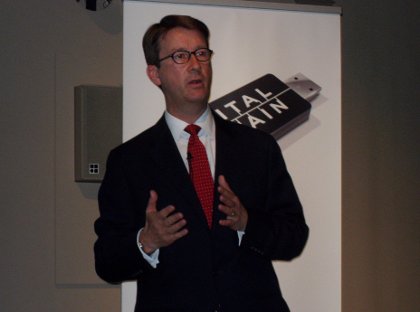UK makes its own broadband splash

The UK government has laid out its vision for the digital future of Britain over the coming years, covering topics such as broadband access, security, ICT literacy and copyright enforcement.

UK Communications Minister Lord Carter (Credit: ZDNet.co.uk)
Lord Carter's Digital Britain report, published on Tuesday in the UK, calls for a monthly 50p charge to be levied on all fixed copper lines, so as to fund the rollout of fibre-based next-generation broadband to almost all the country. A minimum speed of "up to 2Mbps" will have to be in place across the entire UK by 2012, according to the report.
"This is the first publication you will see from the government in its programme for building Britain's future," Lord Carter, the communications minister, said at the report's launch event in London. "The digital economy is central to the industrial capabilities of the UK. We need to start looking at our communications infrastructure in the same way that we look at our, for example, transport infrastructure."
The 50p levy on fixed lines will need to be preceded by new legislation, Carter said, adding that the scheme should raise between £150 million — £175 million per year. Investment by operators should fund a fibre-access rollout across around two thirds of the UK, he said, and the new fund will "subsidise market build-out to the remaining third".
Carter said that, in four to five years' time, fibre access will extend across 90 percent of the UK, and 3G coverage will match the almost universal 2G/GSM coverage available today.
Asked by ZDNet.com.au sister site ZDNet UK whether 2Mbps would provide sufficient speeds to rural businesses in a few years' time, Carter said the report was "not specifying a ceiling, but specifying a floor". He also pointed out that many homes in the UK — around one in 10 — are currently unable to get any broadband access.
"We are not saying that 2Mbps is the height of our ambition," Carter added.
Another topic was securing networks against attack. A national cybersecurity consultation will be announced in the weeks to come, Carter said, when asked who was responsible for the protection of the UK's telecommunications infrastructure. "We will carry out the [UK's] first-ever national disaster-recovery test later this year," he added.
Carter also said that Ofcom would be required to carry out a full assessment of the UK's communications infrastructure every two years.
'Firm view' on file-sharing
Another new task for Ofcom will be
to "significantly reduce unlawful file-sharing", the report stated.
If proposed legislation is passed, it will be charged with forcing
ISPs to deal with customers who are illegally distributing
copyrighted content.
"[The government has] taken a very firm view [that the] piracy of intellectual property is wrong," Carter said at the launch event. "In criminal terms it is theft, and in civil terms, it is just wrong."
The first step ISPs will be asked to take to deal with persistent file-sharers is to send them written warnings, the report said. Repeat infringers will then face having their identities released by their ISPs to the content owner, who should then be able to launch a civil court action.
The report also called for a "suite of technical measures", such as bandwidth reduction or protocol blocking, for ISPs to use if the notification process failed to stop unlawful file-sharing. These steps would be taken only if, after a year of the written-warning scheme being in existence, fewer than 70 per cent of those notified had stopped file-sharing.
The interim version of the Digital Britain report, which was published in January, called for a new rights agency to deal with the file-sharing issue, but this idea has now been dropped. Carter acknowledged at Tuesday's launch that general consensus had seen that idea as a "sledgehammer to crack a nut", and said the best approach would be for the industry to come together and agree a code of practice.
The Digital Britain report also outlined various plans to do with ICT training and research funding. Three new research hubs will be launched this year with £12 million of funding each, and an initial budget of £30 million has been earmarked to push forward innovation related to Digital Britain.
The report also noted recommendations made by the former education secretary, Estelle Morris. These include more provision for IT user training, and a scheme for educating adults who currently lack basic ICT skills.
The Department for Business, Innovation and Skills (BIS) and regional development agencies will also invest £23 million over three years to help small businesses "exploit advanced ICT".